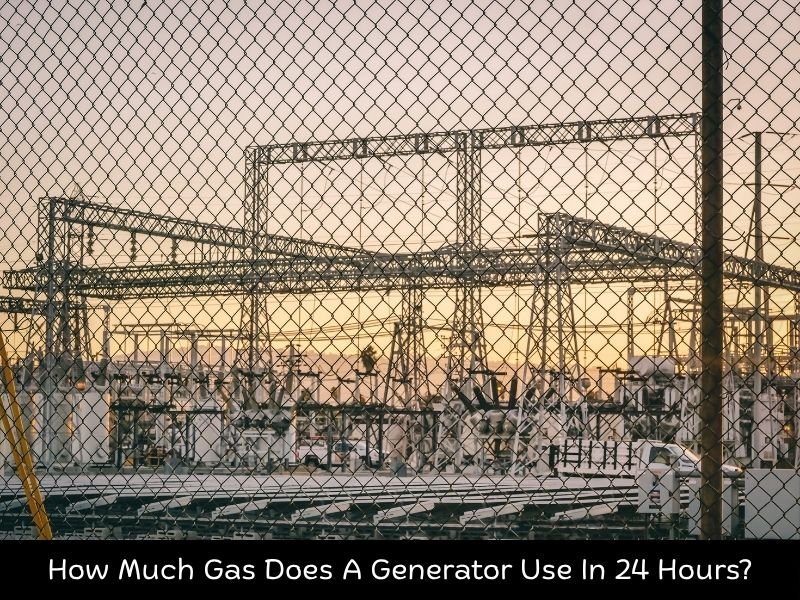When the power goes out or you’re living off-grid, having a generator is invaluable. But one of the biggest concerns for generator owners is fuel consumption. How much gas does a generator use in 24 hours? The answer depends on several factors, including generator type, size, load, and fuel source. In this article, we’ll break down gas usage for different generators, how to estimate fuel needs, and tips to improve fuel efficiency.
Generators can be lifesavers during natural disasters, blackouts, or camping adventures. However, operating them for extended periods, like 24 hours, requires planning, especially when it comes to fuel. Knowing how much gas your generator consumes in a full day helps you:
- Budget for fuel costs,
- Plan safe fuel storage, and
- Ensure uninterrupted power supply.
Before we get into the specifics, let’s explore the types of generators and the fuel they consume.
Table of Contents
ToggleTypes of Generators and Fuel Types
Not all generators are created equal, and fuel efficiency varies significantly between models and fuel types. Here are the primary categories:
Portable Generators
These are commonly used for homes during short outages or in outdoor settings. They typically run on gasoline or propane and range from 1,000 to 10,000 watts.
Standby Generators
These are permanent installations for homes or businesses, often powered by diesel, natural gas, or propane. They can handle entire household loads and can run automatically when power fails.
Common Fuel Types:
- Gasoline: Easy to obtain but volatile and less efficient.
- Propane: Cleaner burning and storable for long periods.
- Diesel: Offers high energy output and efficiency.
- Natural Gas: Delivered via pipelines, suitable for continuous use.
For a deeper dive into fuel types and their environmental impact, check resources from the U.S. Department of Energy.
Average Gas Usage Per Generator Type
Understanding how much fuel your generator uses per hour is key to calculating daily consumption. Here’s a breakdown by fuel type.
Gasoline Generators
These are the most common for portable use.
- Small generator (2,000–3,000W): Uses about 0.2–0.4 gallons/hour
- Mid-size (5,000–7,000W): 0.5–0.8 gallons/hour
- Large (10,000W+): 1–1.5 gallons/hour
Example: A 7,000W gasoline generator running at half load may use 0.7 gallons/hour. Over 24 hours, that’s 16.8 gallons of gasoline.
Propane Generators
Measured in gallons per hour or BTUs.
- Propane contains about 91,500 BTUs per gallon.
- A generator using 2.5 lbs/hour equates to roughly 0.6 gallons/hour.
Example: A 10kW generator at half load might use 1.1 gallons/hour → 26.4 gallons of propane per 24 hours.
For more, the Propane Education & Research Council provides insights into propane generator efficiency.
Diesel Generators
These are typically more fuel-efficient.
- 5kW diesel generator: 0.4–0.6 gallons/hour
- 20kW diesel generator: 1.2–1.5 gallons/hour
Example: A 15kW diesel generator running at 75% load uses around 1.1 gallons/hour → 26.4 gallons in 24 hours.
Natural Gas Generators
Fuel usage is measured in cubic feet per hour.
- Typical range: 100–250 cubic feet/hour depending on size and load.
- 1,000 cubic feet ≈ 1,030,000 BTUs
- A 20kW standby unit may use 200 cu. ft/hr → 4,800 cu. ft. in 24 hours
Visit the U.S. Energy Information Administration to calculate energy costs per cubic foot.
Factors That Affect Generator Fuel Usage
Several variables impact how much fuel your generator burns:
1. Power Load
Running a generator at full capacity burns more fuel. Most generators are more fuel-efficient at 50–75% load.
2. Generator Size and Wattage
A 2,000W inverter uses far less gas than a 15,000W standby unit. Oversizing your generator means unnecessary fuel consumption.
3. Engine Efficiency and Technology
Inverter generators are more fuel-efficient than traditional models. Modern generators with automatic throttle adjustment consume less gas at lower loads.
4. Maintenance and Condition
A poorly maintained generator may burn fuel inefficiently. Dirty air filters, bad spark plugs, or clogged fuel lines reduce efficiency.
5. Weather and Climate
Cold temperatures can thicken oil and reduce efficiency, requiring more fuel to maintain performance.
For tips on generator efficiency and care, check out the National Fire Protection Association for safety standards and maintenance guidelines.
Real-Life Examples and Scenarios
Let’s look at real-world use cases to visualize fuel consumption.
Example 1: Running Essentials with a Portable Generator
- Appliances powered: Refrigerator (600W), LED lights (200W), WiFi/router (100W)
- Total load: ~1,000W
- Generator used: 3,000W inverter (25–30% load)
- Fuel usage: ~0.25 gallons/hour
- 24-hour usage: 6 gallons
Example 2: Whole-Home Standby Generator
- Appliances powered: HVAC, water heater, fridge, lights, electronics
- Total load: ~12,000–15,000W
- Generator used: 20kW diesel standby at 75% load
- Fuel usage: ~1.2 gallons/hour
- 24-hour usage: 28.8 gallons
Comparison Chart (Estimated Usage):
| Generator Type | Size | Load (%) | Fuel Type | Gallons Used (24h) |
|---|---|---|---|---|
| Portable | 3,000W | 30% | Gasoline | ~6 gallons |
| Mid-Size | 7,000W | 50% | Gasoline | ~12–14 gallons |
| Standby | 20kW | 75% | Diesel | ~28–30 gallons |
| Propane | 10kW | 50% | Propane | ~24–26 gallons |
| Natural Gas | 20kW | 75% | NG (cu. ft) | ~4,800 cu. ft |
How to Calculate Your Generator’s 24-Hour Fuel Usage
To accurately determine how much fuel your generator uses over 24 hours, it’s best to refer to the manufacturer’s specifications. However, if those aren’t readily available, you can estimate based on the generator’s fuel consumption rate per hour.
Step-by-Step Calculation:
- Find your generator’s fuel consumption rate (gallons/hour)
Check your owner’s manual, manufacturer’s website, or look up your model online. - Estimate the average load
Are you running the generator at 25%, 50%, or 100% capacity? Generators are most efficient at 50–75% load. - Use the formula:
Fuel usage (24h) = Consumption rate (gal/hr) × 24
Example:
A 6,500W gasoline generator consumes 0.7 gallons/hour at 50% load.
So: 0.7 gal/hr × 24 = 16.8 gallons/day
To simplify this, there are also online generator fuel calculators like those provided by Generac, which allow you to input load size and fuel type for estimated usage.
Fuel Storage & Cost Considerations
Running a generator continuously for 24 hours comes with logistical and financial responsibilities, especially when it comes to storing and purchasing fuel.
Safe Fuel Storage
Storing enough fuel for prolonged generator use is critical. Here’s what to keep in mind:
- Gasoline: Highly flammable and should be stored in approved containers, ideally no more than 30 gallons in total per property (check local codes). Stabilizers like STA-BIL can extend its shelf life up to 12 months.
- Propane: Easier to store long-term in tanks. Standard 20-lb tanks hold about 4.6 gallons.
- Diesel: More stable than gasoline but can degrade; use additives and rotate stock.
- Natural Gas: Delivered via pipeline, so storage isn’t required but not available in all areas.
Refer to the Occupational Safety and Health Administration (OSHA) for regulations on fuel storage and handling.
Cost Estimate by Fuel Type
Fuel prices fluctuate, but here’s a rough estimate based on U.S. averages as of early 2025:
| Fuel Type | Cost per Unit | Avg. 24h Use | Total Cost (24h) |
|---|---|---|---|
| Gasoline | $3.70/gallon | 14 gallons | ~$52 |
| Propane | $2.90/gallon | 24 gallons | ~$69.60 |
| Diesel | $4.10/gallon | 28 gallons | ~$114.80 |
| Natural Gas | $1.60/therm | ~5 therms | ~$8 |
Costs vary by region and usage. Use this as a guide, not a guarantee. Visit AAA’s fuel gauge report for current gasoline and diesel prices.
Tips to Reduce Generator Fuel Consumption
Even if your generator is well-sized for your needs, there are ways to optimise fuel usage and reduce costs.
Prioritize Essential Loads
Only power the appliances you truly need—like the fridge, medical devices, lights, or well pump. Avoid using energy-hungry devices like dryers or space heaters.
Use Inverter Generators
Inverter models adjust engine speed based on demand, improving fuel efficiency. They also produce cleaner power for electronics.
Perform Regular Maintenance
Clean air filters, change oil regularly, and inspect spark plugs. A well-maintained generator runs more efficiently and burns less fuel.
Implement Load Management
Use your generator intermittently instead of continuously. For example, run it for 2–3 hours to cool a fridge or charge devices, then turn it off.
Insulate and Optimize Your Home
Reducing the heating/cooling demand on your generator by weatherproofing your home can significantly lower overall power needs.
For more energy-saving advice, visit the U.S. Department of Energy’s Energy Saver Guide.
Conclusion
The amount of gas a generator uses in 24 hours depends heavily on the generator’s size, fuel type, and load level. On average:
- Portable gasoline generators use between 6–20 gallons/day.
- Standby diesel or propane units can use 20–30+ gallons/day.
- Natural gas units may consume 4,000–5,000 cubic feet per day.
Understanding these numbers helps you budget, store fuel wisely, and avoid mid-emergency surprises. Whether you’re preparing for a blackout or planning an off-grid retreat, knowing your generator’s 24-hour fuel usage is essential to safe and efficient power management.
FAQs
How long will 5 gallons of gas last in a generator?
It depends on the generator’s efficiency and load. A small 2,000W generator might run 10–20 hours on 5 gallons, while a larger one might last only 5–7 hours.
Can a generator run non-stop for 24 hours?
Yes, if it’s designed for continuous operation. Check the manufacturer’s rating. Portable generators may require cool-down or oil checks every 8–12 hours.
Is propane or gasoline better for generators?
Propane stores longer and burns cleaner but has slightly lower energy content. Gasoline is more energy-dense but has a shorter shelf life and is more volatile. Choose based on availability, storage capacity, and usage needs.
What’s the most fuel-efficient generator?
Inverter generators are typically the most fuel-efficient for their size. Diesel standby units offer the best efficiency at high loads but are more expensive and louder.
Is it cheaper to run a generator on natural gas?
Usually yes, if your property is already connected to a natural gas line. It’s more economical and eliminates storage needs.

